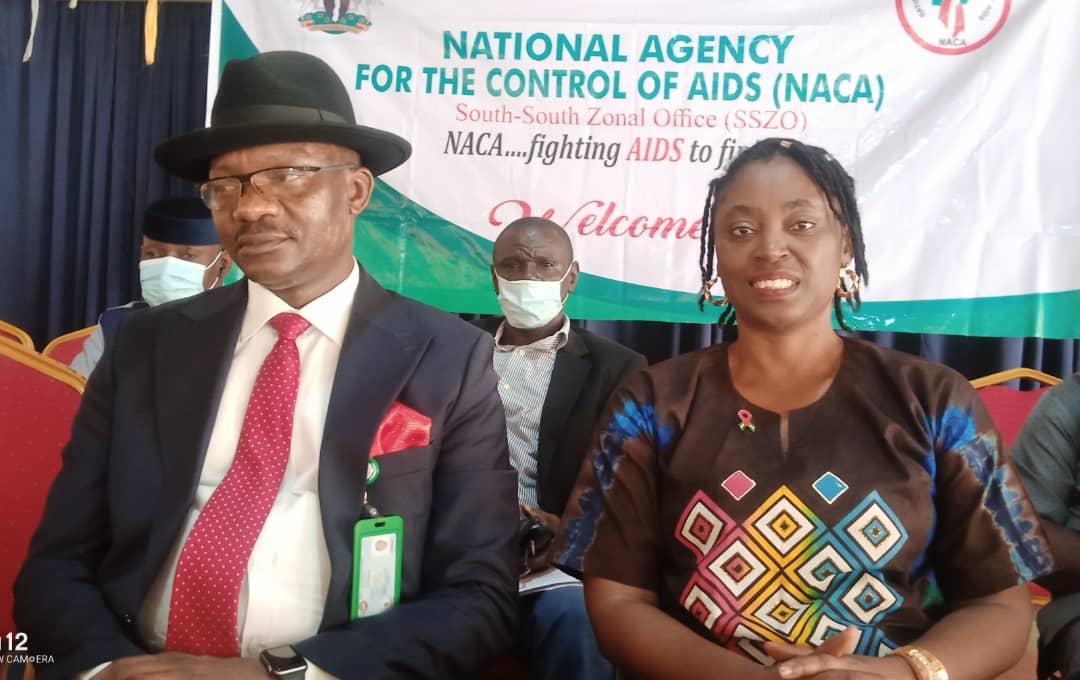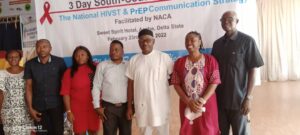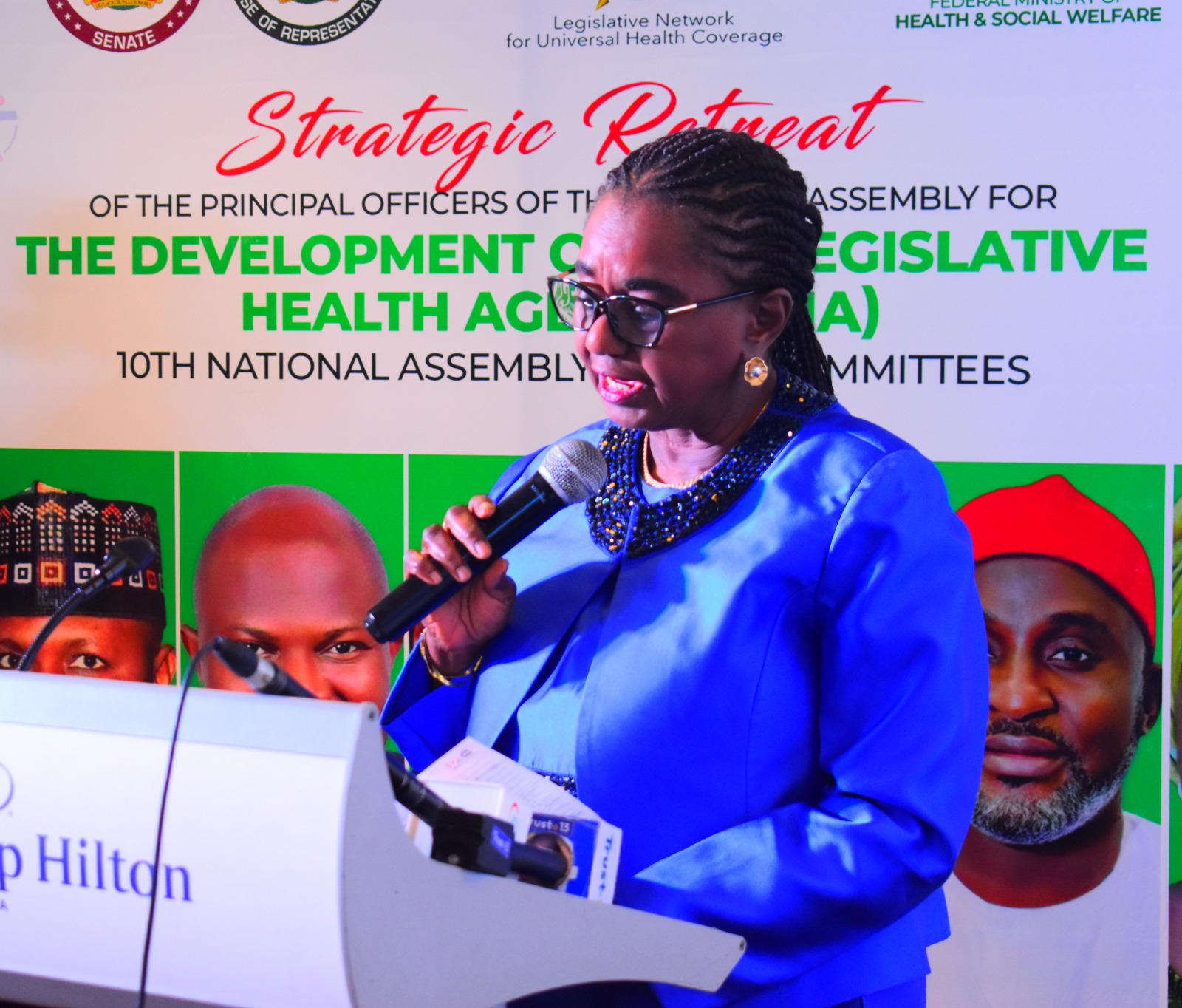Health
‘HIV/AIDS Now Constitutes Social, Governance Issues’

Contrary to widely held belief that HIV/AIDS is solely a medical issue, it is now seen as constituting both social and governance issues.
Disclosing this during a recent three-day South-South training on the National HIV Self Testing (HIVST) and Pre-Exposure Prophylaxis (PrEP) Communication Strategy, held in Asaba, Delta State, the State Commissioner for Information, Hon. Aniagwu Charles Ehiedu, said it is beyond a medical issue.
Speaking while declaring the training open, Ehiedu said HIV/AIDS should now be viewed as being both social and governance issue in order to attract necessary attention towards its elimination.
In terms of it being a social issue, he stated that it is not only those in the medical field that requires information on HIV/AIDS in order to check its transmission.

“Before now, when they talk about HIV, we begin to look for doctors and those in the medical profession to talk to. It’s no longer the case again. Now, you have to talk to even those of us who are not in the medical profession.
“The information you take to people in the villages is not also for people in the medical profession, those who are infected that need to come out to access ART are not just those in the medical profession.
“Again,letting people understand that they don’t need to suffer on account of stigma is not just a medical issue, and getting individuals to embrace the HIVST is not a medical issue.
“These are all social issues that need to be addressed”, he said.
On HIV being a governance issue, the Commissioner explained that if those in governance do not understand the intricacies involved in creating the needed awareness on HIV/AIDS, they would be reluctant to fund programmes on awareness creation.

“If those of us in authority don’t understand these (HIV/AIDS) messages and what to do with them, we are not likely going to provide the funding that is needed to be able to drive the sensitisation process”, he said.
He, therefore, tasked journalists in the training on the importance of their role in the HIV sensitisation process, and other international donor agencies, urging all to be on their toes in the implementation of what is expected of them.
In her opening remarks, the South-South Zonal Coordinator, National Agency for the Control of AIDS (NACA), Dr. Uduak Daniel noted that the three-day communication strategy for key stakeholders was the first of its kind, and was held by the zone.
“ We’re very excited, and because we have an HIV media advocacy platform, we are going to be able to showcase how the programmers and the media can work together, using policy documents to come up with activities that will stand the test of time”, she said.
Daniel expressed the hope that whatever model the Zone will come up with will be the one other zones in the national HIV response will emulate.
On its part, the Lead Implementing partner in Delta State, Caritas Nigeria, expressed its commitment in driving the HIV/AIDS response and other developmental issues in Delta State.
The State Team Lead, Dr. Dorcas Magbadelo, who made this known said, “Caritas Nigeria remains committed to ensuring that epidemic control is achieved in Delta State and across the sister states”.
In attendance at the training were members of the zone’s HIV Media Advocacy Platforms; implementing partners of the zone; and State Agency for the Control of AIDS (SACA) Programme Managers in the zone.
By: Sogbeba Dokubo
Health
FG Launches Initiative To Combat Malnutrition Among Children
The Federal Government has begun a scheme to battle malnutrition in children.
Tagged, “Nutrition 774 Initiative”, the programme was unveiled by Vice President Kashim Shettima as it falls within a framework for the Federal Government’s comprehensive vision for a nationwide nutrition programme to address malnutrition and food insecurity in Nigeria.
The proposed programme, “Nutrition 774 Initiative,” aims to improve nutritional outcomes across all 774 local government areas (LGAs) in the country.
Speaking yesterday during a roundtable with development partners at the Presidential Villa, Abuja, VP Shettima said the initiative aligns with President Bola Ahmed Tinubu’s broader focus on food security and availability across Nigeria.”The priority with which His Excellency, President Bola Ahmed Tinubu, has pursued food availability has gone hand-in-hand with our commitment to eradicating malnutrition.
“Our aspiration as a nation goes beyond the mere abundance of food in our barns and warehouses. We cannot claim victory unless there is certainty that each household across Nigeria has access to the preferred and prescribed diets essential for a healthy life,” the vice president stated.
It would be recalled that the 144th meeting of the National Economic Council (NEC) had in September endorsed the Nutrition 774 programme as a primary platform for combating malnutrition within Nigerian communities.
The council encouraged development partners to provide financial and technical assistance to support this initiative.
Health
Banigo Canvasses E-Health Devices For Nigeria’s Healthcare Dev

The importance of e-Health devices and digital health solutions in improving Nigeria’s healthcare system has been emphasised by Senator Ipalibo Harry Banigo, Chairman of the Senate Committee on Health, Secondary and Tertiary.
She also stressed that health is a multilayered activity and a multisectoral collaboration that requires legislators to work together to provide legislation, implement policies, and track funds effectively.
Banigo, who represents Rivers West Senatorial District in the National Assembly, made these remarks at the 5th Annual Legislative Summit on Health in Abuja, themed “Improving Legislative Stewardship and Accountability for Universal Health Coverage.”
She highlighted the potential of eHealth devices, especially given Nigeria’s large population and limited healthcare professionals.
“We can develop platforms that can be accessed through simple phones, even in remote villages, to provide health education and interventions,” she said.
“We are not talking about highfalutin things; we are talking about what will impact communities at the grassroots level, particularly pro-poor initiatives that will benefit vulnerable populations.”
Banigo also emphasized the importance of accountability and effective care, encouraging legislators to share knowledge, engage in peer reviews, and exchange information to achieve better health outcomes.
She recalled the cholera outbreak, where basic health education and interventions could have been delivered via mobile phones, preventing preventable deaths.
The 5th Annual Legislative Summit on Health brought together federal and state legislators, the Coordinating Minister of Health and Social Welfare, Prof. Muhammad Pate, the World Health Organisation’s representative in Nigeria, Dr. Walter Mulombo, and other dignitaries.
Health
WHO Targets One Billion For Better Health
The World Health Organisation (WHO) says it is targeting 1 billion more people to enjoy better health and well-being will by 2025.
The plan it said is driven primarily by improvements in air quality and access to water, sanitation and hygiene measures.
Meanwhile, the body has listed it achievements in a Report of 2023, the most comprehensive to date.
The report showcases achievements of key public health milestones by the world health apex agency even amid greater global humanitarian health needs driven by conflict, climate change and disease outbreaks.
The report is expected to be released ahead of the 2024 Seventy-seventh World Health Assembly, which runs from 27 May, 1st June, 2024.
WHO revised Programme Budget for 2022–2023 was US$ 6726.1 million, incorporating lessons learned from the pandemic response and addressing emerging health priorities.
With 96percent of WHO country offices providing 174 country reports on achievements, the report shows some progress towards 46 targets and highlights some challenges.
“The world is off track to reach most of the triple billion targets and the health-related Sustainable Development Goals,” said Dr. Tedros Adhanom Ghebreyesus, WHO Director-General. “However, with concrete and concerted action to accelerate progress, we could still achieve a substantial subset of them. Our goal is to invest even more resources where they matter most at the country level while ensuring sustainable and flexible financing to support our mission.”
The report shows advancement in several key areas, including healthier populations, Universal Health Coverage (UHC), and health emergencies protection.
Related to healthier populations, the current trajectory indicates the target of 1 billion more people enjoying better health and well-being will likely be met by 2025, driven primarily by improvements in air quality and access to water, sanitation and hygiene measures.
In terms of UHC, 30percent of countries are moving ahead in coverage of essential health services and providing financial protection. This is largely due to increased HIV service coverage.
Regarding emergencies protection, though the coverage of vaccinations for high-priority pathogens shows improvement relative to the COVID-19 pandemic-related disruptions in 2020–2021, it has not yet returned to pre-pandemic levels.
The Pandemic Fund’s first disbursements totaled US$ 338 million in 2023, supporting 37 countries to fund the initial response to acute events and scale up life-saving health operations in protracted crises. WHO continues to work with countries and partners to enhance genomic sequencing capabilities and strengthen laboratory and surveillance systems worldwide with capacity increased by 62percent for SARS-CoV-2 between February 2021 and December 2023.
It said one of the achievements is the world’s first malaria vaccine, RTS,S/AS01 administered to more than two million children in Ghana, Kenya, and Malawi during the biennium, reducing mortality by 13% among children eligible for vaccination. WHO’s prequalification of a second vaccine, R21/Matrix-M, is expected to further boost malaria control efforts.
The first-ever all-oral treatment regimens for multi-drug-resistant tuberculosis were made available in 2022, allowing the highest number of people with tuberculosis to get treatment since monitoring began almost 30 years ago.



